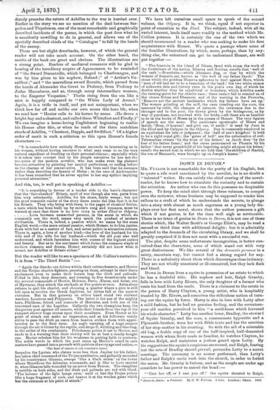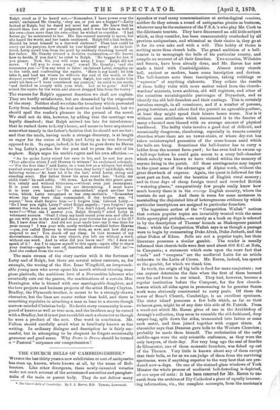DOWN IN DEVON.*
Mn. FULLOM is not remarkable for the purity of his English, but to quote a vile word sanctioned by the novelist, he is no doubt a "talented" writer. He can satisfy the chief craving of the novel- reader, for he knows how to stimulate the curiosity and to sustain the attention. An author who can do this possesses no despicable power. To keep the mind alert through three volumes, to compel even the reviewer, whose business may be supposed to render him callous to a craft of which he understands the secrets, to plunge into a story with almost as much eagerness as a young lady dis- plays over her first novel, shows that the author possesses a gift which if not genius, is for the time well nigh as serviceable. There is no trace of genius in Down in Devon, it is not one of those stories which, like Walter Scott's or George Eliot's, may be read a second or third time with additional delight ; but it is admirably adapted to the demands of the circulating library, and we shall be greatly surprised if it does not meet with a successful run.
The plot, despite some unfortunate incongruities, is better con- ceived than the characters, none of which stand out with very great distinctness. We like several of the dramatis persona in a misty, uncertain way, but cannot feel a strong regard for any. There is a nebulosity about them which discourages close intimacy. They are not wholly unnatural or ill-conceived, but they lack flesh and blood.
Down in Devon lives a squire in possession of an estate to which he has a doubtful title. His nephew and heir, Ralph Granby, falls in love with Letty Rivers, the only daughter of a farmer who rents his land from the uncle. There is a claimant to the estate in the person of Harry Clayton, a young artist, who is hospitably treated by Mr. Rivera, and conceives the ridiculous notion of turn- ing out the squire by force. Harry is also in love with Letty after a mild fashion, but he had no genuine feeling, and the seventeen- year old maiden perceived in him " a sordidness which leavened his whole character." Letty has another lover, Bradley, the steward of Squire Granby, and the man, a consummate hypocrite and a Plymouth-brother, woos her with Bible texts and has the sanction of her step-mother in his courting. So with the aid of a miserable old hag, a feeble copy of one of the half-inspired, half-demented women with whom Scott made us familiar, he watches Clayton, he watches Ralph, and maintains a jealous guard upon Letty. By his suggestions the squire's suspicions are roused, and Ralph, fearing lest the arts of Bradley should prevail, persuades Letty to a secret marriage. The ceremony is no sooner performed, than Letty's father and Ralph's uncle rush into the church, in order to forbid the union. Mr. Granby is furious, and as the couple are under age considers he has power to cancel the bond :—
"' Cast her off, or I cut you off !' the squire shouted to Ralph.
• Down in Devon : a Pastors!. By S. W. Fultom. 8 vols. London: Skeet. 1869. Ralph stood as if he heard not—' Remember, I have power over the entail,' exclaimed Mr. Granby, obey me, or you are a beggar!'—Letty looked at Ralph, but he dared not meet her gaze. He knew that he should then lose all power of judgment, and it was her fate as well as his own—hers more than his own—that he wished to consider. 'I had better go,' he murmured to her. His lips seemed scarcely to move, but she heard the words, and her hands unclasped. Ralph felt slink broken. Should he trust himself to a farewell embrace? Then how could he carry out his purpose, how should he tear himself away? As he hesi- tated, Letty saved him from the peril by suddenly throwing herself on her father. Mr. Granby uttered a decisive exclamation.—' She knows how to decide, if you don't,' he cried to Ralph. No beggar for her, if you please. Now, Sir, you will come away, I hope.' Ralph did not
move. tell you to come away !' roared Mr. Granby; 'and she renounces you.'—'You say what is false,' exclaimed Letty, stepping up to the table, and confronting the squire. Here is my hand ; let him take it, and lead me where he will—to the end of the world, or the deepest poverty !' All eyes turned upon Ralph, but only to make him avert his face.= I have considered my position,' he cried to his uncle, and decided to comply with your wish. Let us be gone.' And he seized the squire by the wrist, and almost dragged him from the vestry."
The reasons for Ralph's apparent desertion we shall not explain. They are hardly satisfactory, but are demanded by the exigencies of the story. Neither shall we relate the treachery which prevented Letty from understanding the real motives of her husband, lest we should spoil the reader's pleasure in the perusal of the novel. We shall not do this, however, by adding that the marriage was legally dissolved ; that Ralph arrived too late for interference ; that he rushed down to Latty's house, and seems to have acquiesced somewhat tamely in the father's decision that he should not see her ; and that the uncle, having made a strange discovery, is at length as eager for the union of Ralph and Letty as he was formerly opposed to it. So eager, indeed, is he that he goes down to Devon to beg Letty's pardon for the past and to press the suit of his nephew. Ralph urges his uncle's regret and his own affection :—
" As he spoke Letty raised her eyes to his, and be met her gaze. 'That affection which I call Heaven to witness!' he exclaimed solemnly. —`For the first time ?' aaid Letty, in a tone low as a whisper, but which reached every ear.—' Not for the first time, dear Letty P said Ralph, with faltering 'voice.—'At least let it be the last,' cried Letty, rising and standing erect. Her father threw his arms round her. Letty, my -child, hush !' he said softly. ' Sit down. Let us decide this grave ques- tion calmly and without bitterness,—without even just resentment. It is your own future life you are determining. I must leave it in your own hands.' — Be admonished,' urged another low
voice, which Letty recognized as her step-mother's. Remember whose lips they were that commanded, if thy brother say, "I repent," thou shalt forgive him.'—' I forgive him,' faltered Letty.— *Do I hear you right, Letty ?' cried Ralph eagerly; ' you forgive! you retract the words you just uttered ? You don't reject, don't spurn my vows ?'—' What can I answer you, Ralph Granby ?' cried Lotty in vehement accents. Shall I clasp my hand round your arm and offer to go out with you in the world and share your fortune for good or for ill? Sir, I have done this ! And did not your uncle here say it was done for your money ? I was your wife, newly wedded—wedded before Heaven —yes, you called Heaven to witness then, as now, and how did you respond to me ? You shook off my clasp. In that moment of my devotedness—there, in the very church, you left me without a word, without one word. And to what did you leave me ? Oh! I dare not speak of it ! Am I to expose myself to this again—again offer to share your destiny—again be cast off, deserted, and divorced? No! no!'— And she rushed from the room."
The main stream of the story carries with it the fortunes of Letty and of Ralph, but there are several minor currents, as, for example, the wooing of the Rev. Isaac Wingfield, an irreproach- able young man who never opens his mouth without uttering some pions platitude, the ambitious love of a Devonshire labourer who eventually cuts out the parson, the machinations of a certain Mrs. Dorrington who is blessed with one marriageable daughter, and the love projects and business projects of the artist Henry Clayton. Bradley, the Plymouth-brother, is meant to be a strongly-drawn character, but the lines are coarse rather than bold, and there is something repulsive in attaching a man so base to a sincere though narrow-minded Christian body. No doubt every community is com- posed of knaves as well as true men, and the brethren may be cursed with a Bradley, but it is not just to exhibit such a character as though he were a product of the sect. One word in conclusion. Air. Fullom should carefully avoid what is familiarly known as fine writing. In ordinary dialogue and description he is fairly suc- cessful, but in attempting to be eloquent he forgets occasionally grammar and good sense. Why Down in Devon should be termed a " Pastoral " surpasses our comprehension !



































 Previous page
Previous page